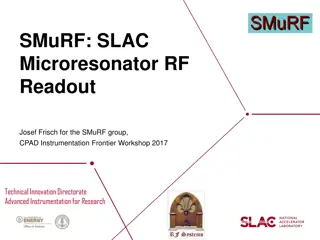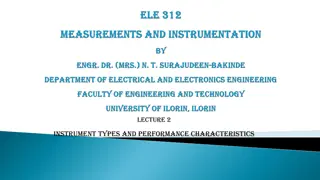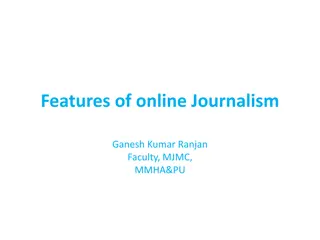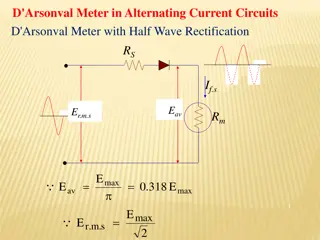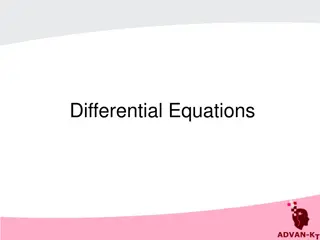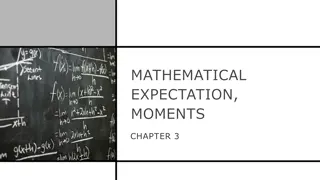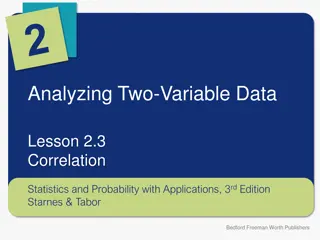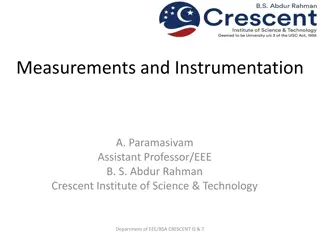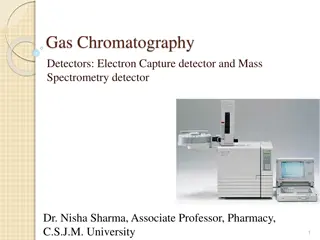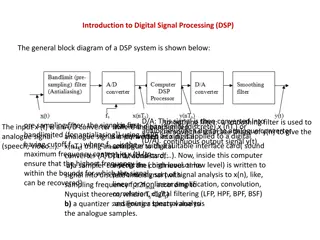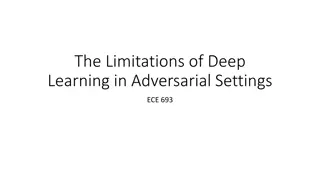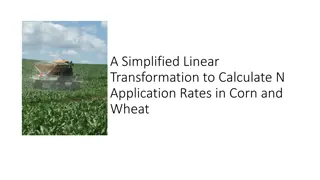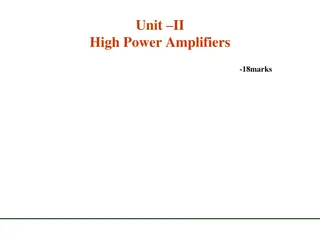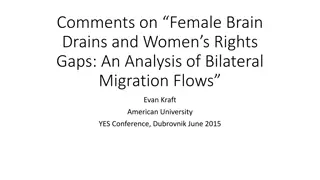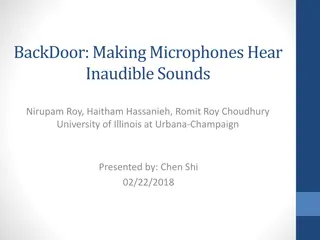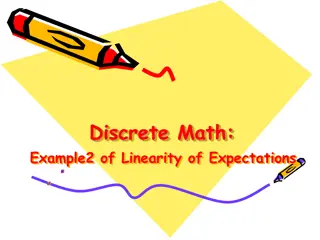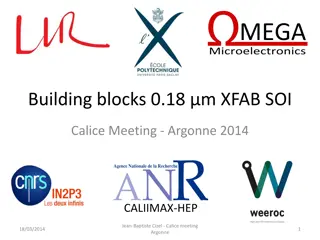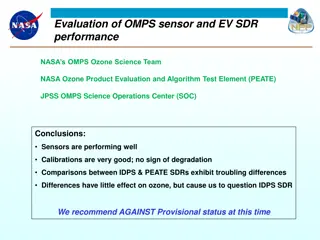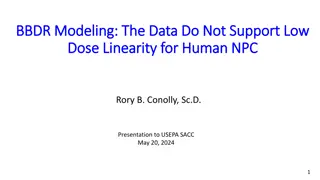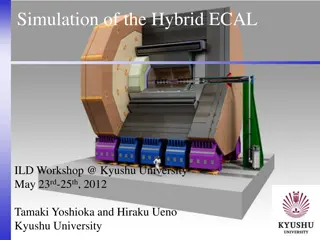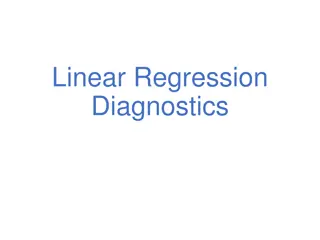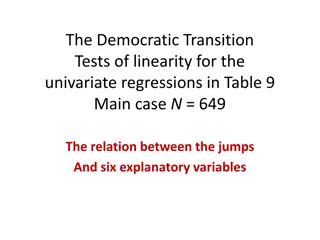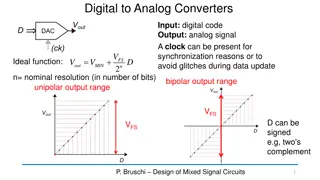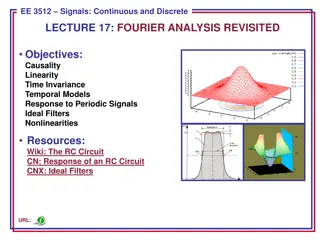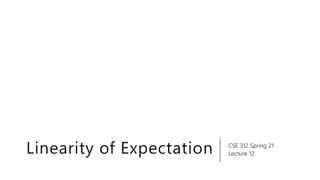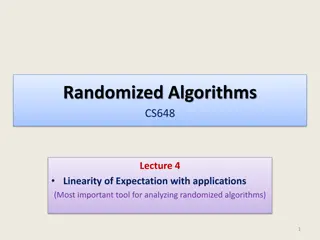SMuRF: SLAC Microresonator RF Readout
SMuRF group at SLAC developed a cutting-edge RF readout system for cryogenic micro-resonators used in research. The system features cold resonators tuned with TES current and a flux ramp to eliminate 1/f noise. Key technical challenges include noise, linearity, wide bandwidth, and computation power.
5 views • 16 slides
Instrument Types and Performance Characteristics
This content discusses different types of instruments, including active and passive, null-type and deflection-type, analog and digital, as well as smart and non-smart instruments. It delves into the static characteristics of instruments such as accuracy, precision, tolerance, linearity, and sensitiv
3 views • 39 slides
The Features of Online Journalism by Ganesh Kumar Ranjan
Online journalism features hypertextuality, interactivity, multimediality, and immediacy. Hypertext enables multi-linearity and multi-vocality, changing the narrative paradigm. Active reading allows readers to navigate content with flexibility, though it may challenge authors’ control. Ganesh Kuma
0 views • 7 slides
D'Arsonval Meter in Alternating Current Circuits
Explore the principles behind D'Arsonval meter in AC circuits, including half-wave rectification. Learn about sensitivity differences between DC and AC voltmeters, calculating series resistance, multiplier resistor values, and practical applications. Discover how shunt resistors improve linearity in
4 views • 13 slides
Differential Equations: Types, Classification, and Solutions
Differential equations are mathematical equations that relate independent and dependent variables through differential coefficients. They can be classified as ordinary or partial, based on the types of derivatives involved. The order and degree of a differential equation, as well as its linearity an
5 views • 26 slides
Mathematical Expectation and Moments in Probability
Mathematical expectation, also known as expected value, plays a crucial role in probability theory. It represents the average outcome or value of a random variable by considering all possible values weighted by their respective probabilities. This concept helps in predicting outcomes and making info
1 views • 17 slides
Correlation in Two-Variable Data Analysis
Exploring the concept of correlation in analyzing two-variable data, this lesson delves into estimating the correlation between quantitative variables, interpreting the correlation, and distinguishing between correlation and causation. Through scatterplots and examples, the strength and direction of
0 views • 13 slides
Static and Dynamic Characteristics of Instruments in Measurements and Instrumentation
This educational material delves into the functional elements of an instrument, static and dynamic characteristics, and the importance of accuracy and sensitivity. It covers topics such as linearity, repeatability, speed of response, and more. The content provides valuable insights for students and
1 views • 27 slides
Evolution of Strategic Management in Tourism: A New Paradigm
Explore the radical transformations in strategic management over the past 25 years, focusing on the New Strategic Theory and the Half Moon Bay Group initiatives. Discover how complexity, non-linearity, and fluidity guide the new emergent paradigm. Learn about the changes in approach to strategy and
3 views • 11 slides
Electron Capture Detector in Gas Chromatography
Gas Chromatography Detectors include the Electron Capture Detector (ECD), which detects ions exiting the chromatographic column by the anode electrode. It is commonly used for halogenated organics like insecticides and pesticides. The ECD works by capturing electrons from the carrier gas, leading to
2 views • 12 slides
Digital Signal Processing (DSP) Systems: Linearity, Causality, and Stability
Digital Signal Processing (DSP) involves converting signals between digital and analog forms for processing. The general block diagram of a DSP system includes components like D/A converters, smoothing filters, analog-to-digital converters, and quantizers. DSP systems can be classified based on line
1 views • 12 slides
Microbiological Inspection of Mineral Water by Redox Potential Measurement
MicroTester is a validated method for rapid microbiological testing of various types of water such as mineral water and carbonated water. Real-time monitoring of microbial properties in water production is crucial for ensuring safety and quality. The energy for microbial growth comes from biological
0 views • 27 slides
Limitations of Deep Learning in Adversarial Settings
Deep learning, particularly deep neural networks (DNNs), has revolutionized machine learning with its high accuracy rates. However, in adversarial settings, adversaries can manipulate DNNs by crafting adversarial samples to force misclassification. Such attacks pose risks in various applications, in
0 views • 38 slides
Simplified Linear Transformation for N Application Rates in Corn and Wheat
Dr. Brenda Ortiz and Dr. Bill Raun led an investigation on predicting grain yield using optical sensors in corn and wheat. The challenges with the symmetric sigmoid model for yield prediction led to the development of a simplified linear transformation approach. Assumptions were made to create a mod
1 views • 28 slides
High Power Amplifiers with BJT for Efficient Performance
Explore the world of high-power amplifiers utilizing BJT technology, focusing on factors like linearity, efficiency, and maximum power capability. Learn about different amplifier classes - A, B, AB, and C - each with unique operating characteristics. Discover the significance of amplifier efficiency
0 views • 22 slides
Analysis of Female Brain Drains & Women's Rights Gaps in Bilateral Migration Flows
Observations show women migrate more than men, affected by factors like family reunification. Skilled women migrate more than skilled men, contributing to brain drain. Research examines impact of women's rights gap on female brain drain ratio using a non-linear model, indicating a complex relationsh
1 views • 8 slides
Unlocking Microphones to Hear Inaudible Sounds Using BackDoor System
Researchers from the University of Illinois at Urbana-Champaign have developed the BackDoor system, which allows regular microphones to record high-frequency inaudible sounds by leveraging hardware non-linearity. The system utilizes a linear amplifier with non-linear behavior to capture signals at f
0 views • 17 slides
Advanced Analysis in Pharmacy: Deviations from Beer-Lambert Law
Explore the complexities of advanced analysis in pharmacy through deviations from Beer-Lambert Law, including real, instrumental, and chemical deviations. Understand limitations, causes of nonlinearity, and the role of instrumentation in spectrophotometry. Dive into topics such as irregular and regu
0 views • 41 slides
Linear Functions: Slope and Changes in Variables
Linear functions and their relationship to slope are explored in this content. Understanding how changes in the independent variable affect the dependent variable is key to interpreting linear relationships. Through visual representations and explanations, this content illustrates the concepts of li
0 views • 23 slides
Analog-to-Digital Converters (ADCs) in Electronics
Explore different types of ADCs such as Flash ADC, SAR ADC, and the Comparator in this informative content. Learn about error sources, bubble correction, and binary search techniques used in ADC design. Gain insights into the importance of hysteresis, resolution support, and linearity in ADC functio
0 views • 13 slides
Linearity of Expectations in the Hat Check Problem
In this example of linearity of expectations, we explore the Hatcheck Problem where a new employee checks the hats of n people at a restaurant without assigning claim check numbers. When customers return for their hats, they are randomly given hats. The expected number of hats returned correctly is
1 views • 5 slides
Comprehensive Study on XFAB SOI Technology for Digital Electronics
Analog building blocks using XFAB SOI technology with adjustable feedback capacitors, slow and fast shapers, simulation results, linearity up to 8.36 pC, discriminator efficiency, and Monte Carlo analysis. Issues regarding noise contributions and feedback capacitance are also discussed. Presented at
0 views • 13 slides
Evaluation of OMPS Sensor and EV SDR Performance by NASA
NASA's OMPS Ozone Science Team conducted an evaluation of the OMPS sensor and EV SDR performance, concluding that the sensors are performing well with good calibrations and no signs of degradation. There were troubling differences between the IDPS and PEATE SDRs, leading to a recommendation against
0 views • 29 slides
Determining Linearity of Functions Through Graphs, Tables, and Equations
Students learn to distinguish between linear and nonlinear functions by examining graphs, tables, and equations. Linear functions exhibit constant rates of change, represented by straight lines, while nonlinear functions lack a constant rate of change, leading to curved or non-linear graph shapes. B
0 views • 11 slides
Analysis of BBDR Modeling for Human NPC Dose Linearity
The BBDR modeling for human NPC dose linearity is examined through various studies and updates from 2003 to 2024. Key aspects include formaldehyde BBDR, regulatory acceptance/rejection, EPA/IRIS concerns, and the 2023 BBDR model update addressing main issues. The 2023 BBDR model presents two version
1 views • 10 slides
Statistical Tools for Method Validation in USP General Chapter 1210
In the USP General Chapter 1210, Statistical Tools for Method Validation are outlined, serving as a companion to the validation of Compendial Procedures. The chapter covers important topics like Accuracy, Precision, Linearity, LOD, LOQ, and range. It emphasizes statistical tools such as TOST, statis
0 views • 22 slides
Simulation of the Hybrid ECAL Workshop at Kyushu University 2012
Hybrid ECAL, a solution combining Silicon and Scintillator-strip layers, was studied at the workshop held at Kyushu University in May 2012. The configuration, parameters, calibration, and performance evaluation of the Hybrid ECAL were discussed. The study focused on achieving a cost-effective ECAL w
0 views • 10 slides
Complexity of Academic Writing and Non-Linearity
The concept of academic writing is examined, highlighting its contestable nature and emergent quality. The linear nature of English writing and the importance of non-linearity in academic texts are discussed. Various scholars in diverse fields contribute to the discourse, emphasizing the multiplicit
1 views • 22 slides
Linear Regression Diagnostics
The essential conditions for a valid least squares line in linear regression, including linearity, nearly normal residuals, and constant variability. Learn how to assess linearity through scatterplots, evaluate residuals' normality using histograms or Q-Q plots, and understand the anatomy of residua
0 views • 15 slides
Rad Trips & Target Sequence in High-Intensity Study
In the ongoing experiment, rad trips are observed during beam cycles, prompting a study on the effects of higher intensity in the switchyard. The target sequence includes materials like tungsten and deuterium. The goal is to investigate backscatter from the target and the implications for rad detect
0 views • 8 slides
Democratic Transition Tests for Linearity in Univariate Regressions
This analysis examines the linearity of univariate regressions with 649 data points. It explores the relationship between variable jumps and six explanatory factors. The study aims to understand the impact of these variables on the democratic transition process. The findings in Table 9 indicate the
0 views • 7 slides
ASICs - Status
This content discusses the current status of ASICs at the University of Heidelberg, focusing on the DCD pipeline and standard versions submitted in 2013. It highlights the ongoing tests on EMCM, potential improvements for future submissions, and specific issues relating to transistor mismatch and cu
0 views • 22 slides
Digital to Analog Converters
Digital-to-Analog Converters (DACs) play a crucial role in converting digital data to analog signals. Explore DAC applications, performance parameters, potential errors like quantization error and non-linearity, and DAC architectures such as R-2-R ladder and Switched Capacitors. Understand the impor
0 views • 26 slides
Ordinary Differential Equations in Numerical Methods
Delve into the world of Ordinary Differential Equations (ODEs) in numerical methods. Explore how to solve ODEs, assess different techniques' reliability, and choose the right method for various problems. Topics include ODE definitions, order, linearity, solution methods, derivatives, and differentia
0 views • 24 slides
Addressing Inter-individual Variabilities in
Linear health risk/impact assessments are widely used, assuming linearity and homogeneity in human responses to toxicants. However, non-linearity is common, reflecting differences in dietary patterns, behavior, genetics, and development stages. A study aims to simulate US population exposures to lip
0 views • 21 slides
Understanding Causality, Linearity, and Time-Invariance in Signal Processing
Explore the concepts of causality, linearity, and time-invariance in signal processing. Learn how these principles impact system behavior and signal analysis, with real-world examples and implications for various systems.
0 views • 11 slides
Additive Combinatorics in Theoretical CS: Linearity Testing and Applications
Explore the world of linearity testing and additive combinatorics in theoretical computer science through methods such as property testing, discrete Fourier transform, and character maps. Discover how to analyze functions and data for specific properties efficiently.
0 views • 32 slides
Understanding Linearity of Expectation in Random Variables
Explore the concept of linearity of expectation in random variables, including its definition, intuition, and proof. Discover how this concept applies to multiple random variables and scenarios in a practical example involving fishing.
0 views • 26 slides
Analyzing Randomized Algorithms: Linearity of Expectation and Applications
Explore the concept of linearity of expectation in randomized algorithms, a crucial tool for analysis. Learn about random variables, expected values, and solve problems using this fundamental concept.
0 views • 27 slides
Linearity Testing in Advanced Algorithms
Explore linearity testing for Boolean functions in advanced algorithms. Understand the concept of linear functions, sublinear time algorithms, and distinguishing between linear and non-linear functions. Dive into practical exercises to enhance understanding.
0 views • 26 slides
